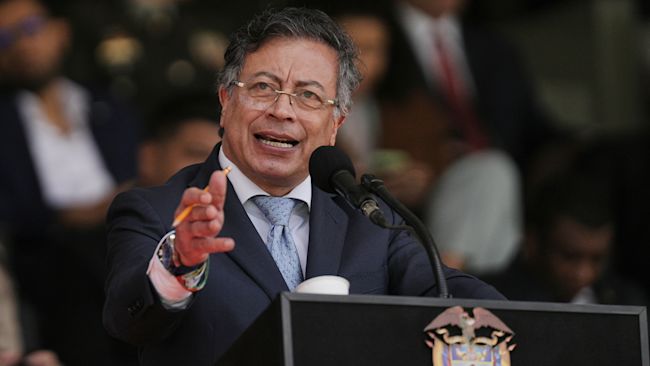

ITVNEWS: The UK has reportedly stopped sharing intelligence with the US about suspected drug trafficking vessels in the Caribbean because it does not want to be complicit in US military strikes and believes the attacks are illegal.
Downing Street did not deny reporting by CNN that the UK is withholding intelligence following US strikes on suspected drug smuggling vessels, which have killed at least 70 people since September.
Britain, which controls a number of territories in the Caribbean, has previously helped the US identify vessels suspected of carrying narcotics so that the US Coast Guard could intercept them.
That meant the ships would be stopped, boarded, their crews detained, and drugs seized.

However the UK government has stopped sharing this information with its ally amid concerns the US military strikes it believes may breach international law.

The UK’s decision marks a significant break from its closest ally and intelligence-sharing partner and underscores the growing scepticism over the legality of the US’s campaign.
The intelligence was typically sent to Joint Interagency Task Force South, a task force stationed in Florida that includes representatives from a number of partner nations and works to reduce the illicit drug trade.
But shortly after the US began launching lethal strikes against the boats in September, however, the UK grew concerned that the US might use intelligence provided by the British to select targets.

British officials believe the US military strikes, which have killed 76 people, violate international law, sources told CNN.
The UN’s human rights chief, Volker Türk, said last month that the strikes violate international law and amount to “extrajudicial killing.”
The UK agrees with that assessment, the sources told CNN.
When asked directly, the government did not deny the report, with a spokesperson saying: “It is the long-standing position of successive governments is not to comment on intelligence matters.“The UK and the US have an extensive intelligence sharing relationship ranging from law enforcement through to national security and 5Eyes.”
Canada, another key US ally which has helped the US Coast Guard interdict suspected drug traffickers in the Caribbean for nearly two decades, has also distanced itself from the policy, with the country reportedly telling the US it does not want any of its intelligence being used to help target boats for strikes.
Colombian President Gustavo Petro, who has been a fierce critic of the strikes, said on Tuesday that he had similarly ordered his country’s security forces to suspend intelligence sharing with US security agencies until the attacks in the Caribbean stop.
The Trump administration has argued that the US military can legally kill suspected traffickers because they pose an imminent threat to Americans and are “enemy combatants” who are in an “armed conflict” with the US, according to a memo sent by the administration to Congress.
Trump has also designated a number of drug cartels as “foreign terrorist groups.”
The White House has said repeatedly that the administration’s actions “comply fully with the Law of Armed Conflict,” the area of international law that is designed to prevent attacks on civilians.
This stance has not been fully accepted by international law experts in the US.
Several boats hit by the US have either been stationary or were turning around when they were attacked, undermining the administration’s claim that they posed an imminent threat that could not be dealt with through interdiction and arrest.
Senior US defense officials have also expressed scepticism of the military campaign.
The commander of US Southern Command, Admiral Alvin Holsey, offered to resign during a tense meeting last month with Secretary of War Pete Hegseth and Chairman of the Joint Chiefs of Staff after he raised questions about the legality of the strikes.
He is set to leave his post next month, just one year into the job.
Advertise with the mоѕt vіѕіtеd nеwѕ ѕіtе іn Antigua!
We offer fully customizable and flexible digital marketing packages.
Contact us at [email protected]














Ha!! All a stunt they will help them u wanna know why??? 1914-1918 WW1 US help UK beat Germany and then 21 years later 1939-1945 US help UK beat Hitler (Germany)…The US been helping the the UK for decades they even shared their information on nuclear weapons with them. That’s just like when a sibling says I ain’t helping my brother in no more fights then he gets in a fight and boom he right there….. Every single conflict America has been in the UK has always been right there because they know they owe the US big time…
One small fact to put right. The US did not share nuclear knowledge with the UK , they tried to withhold it but as the UK had given the US most of the knowledge required to build nuclear weapons and supplied together with other European countries a large number of the scientists it was not too much of a problem to build their own nuclear weapons
Lets get it right…..They shared knowledge fine but they did not give them most of the knowledge…Where u get that from??? Give them most of the knowledge and if the US never stepped in they would of eventually gotten conquered by the Nazis due to draining resources and man power…..Sooooooo…..USA Help them BIG TIME…..First World War the UK BEGGED President Woodrow Wilson for Help eventually when America got fully involved in the war in 1917 they it was over one year later……World war two once again the UK BEGGED President Franklyn D Roosevelt for help eventually thanks to Japan bombing Pearl Harbour the US entered in 1941 and help England push back Hitler and the Nazis and bombed the crap out of Japan……THE UK OWE THE US BIG TIME THEY WILL NEVER TURN THEIR BACK ON THE USA…DON’T BELIEVE THIS ARTICLE IT’S JUST A BLUFF TO CALM US DOWN IN THE REGION….WHEN THE US IN VIETNAM SPRAYING DOWN VIETNAMESE CHILDREN WITH AGENT ORANGE GUESS WHO WAS RIGHT THERE WITH THEM THE UNITED KINGDOM!!! SO PLEASE PLEASE FOOL THEM BUT NOT ME!!!!!!
I dunno why people making a big issue out of this America going after a dictator…Why because Trump at the wheel??? When America entered Libya to kill the dictator Muammar Gaddafi they killed many of his soldiers before they got to him and guess who gave the orders y’all precious black president Obama and y’all quite about that emmmmm ok I seee but because it’s Trump ohhh he sooo wicked….SMH
WHEN THE SAME UNITED KINGDOM GO DOWN SOUTH AMERICA BY ARGENTINA AND FIGHT THE PEOPLE AN DEM FOR AN ISLAND THAT BELONG TO ARGENTINA!!!!!!! BRITISH TERRITORY THEY TAKE FROM ARGENTINA…..
THE SAME UNITED KINGDOM THAT HELP AMERICA IN IRAQ AND MURDERED ALOT OF INNOCENT IRAQIS!!!!! THE SAME UNITED KINGDOM??!??!
Then, @this world is a messed up place…this present War On Drugs, as folks like you keep spewing is Total Recall indoctrinated fuckery to go to War and rob other Nation’s for their riches, whenever, their EUROPE and or America’s coffers are running low, in their mind.
The premise is, they (other Nations) got what WE (Family – the Church of England and Capitaline Hill, Rome & Capitaline Hill, America wants….Archie Bunker and All In The Family); so, again, yet again, this present armed aggression by America is not about, stopping Wall Street addicts from their daily fixes of heroine, Hollywood to Vegas to the whorehouses in Washington DC from their annual supply of cocaine, to meth, to fentanyl to mollies to aderall.
The WAR GAMES, which they play!
Jumbee Picknee aka Ras Smood
De’ole Dutty Peg 🦶🏿Garrat_Bastard
Vere Edwards
Comments are closed.